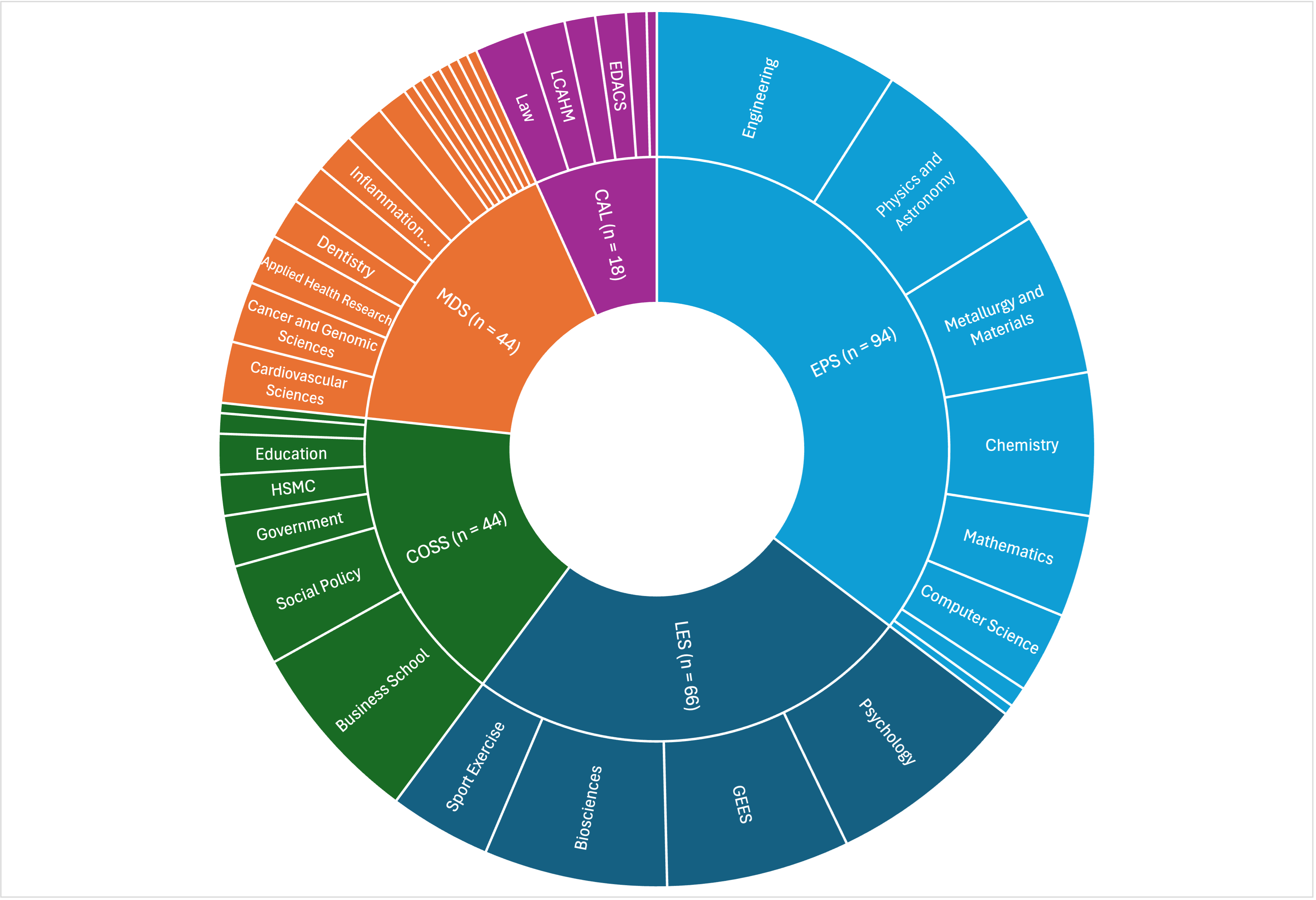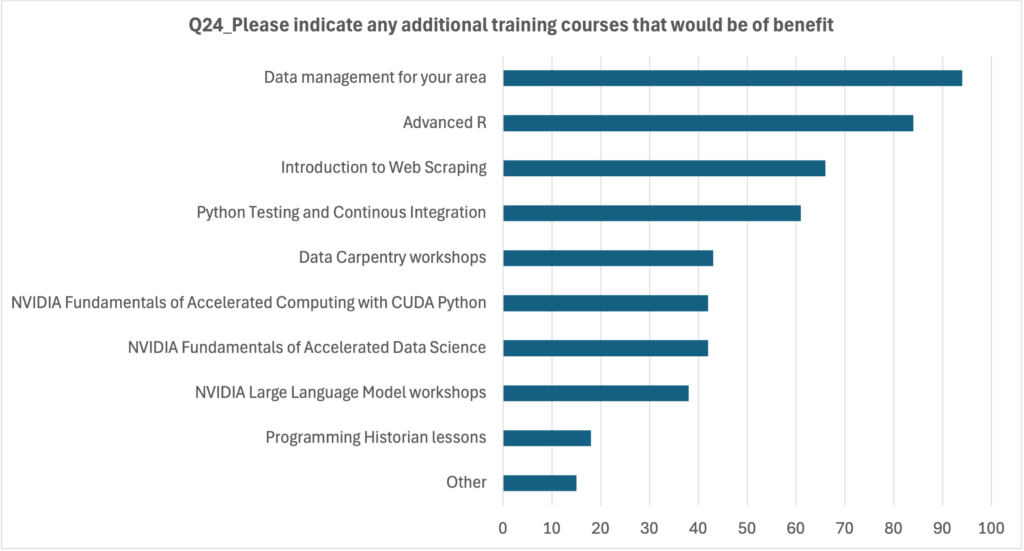We were pleased to see a 54% increase in responses to the Pro-Vice Chancellor for Research (PVC-R’s) ‘IT Needs of Active Research Survey 2024’ compared to the previous survey in 2022. Thank you to everyone who took the time to respond and to share their views. The Survey aims to understand the IT you need to enable your research and understand how that is changing over time – for reference, the full set of questions is available in the pdf (see Appendix).
The survey was open between 19 February and 18 March 2024 and was completed by 266 researchers, 75% research staff, and 25% research students. Researchers from all colleges responded to the survey, with Engineering and Physical Sciences (EPS) having the most responses (35%) (see figure below).

Satisfaction levels with the Birmingham Environment for Academic Research (BEAR) remain high (averaging 4.2 out of 5 from 196 responses), with several comments highlighting the good support they received from Advanced Research Computing (ARC):
System works well and the range of courses and support is improving all the time. Bear just needs to keep expanding. Courses are great and dedicated coding expertise would be very valuable – Academic in Economics
I am very happy about the RDS and BEAR services and support. Its professionally run and we could not do our research without – Academic in Psychology
BEAR services offer an excellent foundation for research – Professor Hugh Houghton, Theology and Religion
When analysing the results, we have looked for overall trends in the feedback, which we discuss below, as well as following up directly where comments were specific to one or two individuals. We have discussed results with the PVC-R’s Digital Research Committee, and data management comments with Library Services. Feedback has also been provided to the University’s Chief Information Officer (CIO) and the units in IT Services responsible for other aspects of the service. Your input is invaluable in informing plans and shaping service developments.
Lack of awareness
The most common area where there were comments around BEAR services not meeting needs (12 comments), was a lack of awareness about what is available for researchers. With an ever-changing researcher base it is tricky to reach everyone at the University, but this is one of the aims of the Researcher Engagement and Data Group (REDG). REDG recently expanded, with an additional 0.5FTE post, and works in conjunction with 17 BEAR Champions that voluntarily help us spread the word about BEAR. You can read more about our outreach activities in the REDG annual report (see below) e.g. we spoke with over 1185 research staff/students at 27 University events in 2023, double the number that we engaged with in 2022. From comments made in the Survey, it seems the Survey itself seems to have raised awareness (25% of respondents were non-BEAR users), and we are already in the process of finding a way to reach all researchers for the next exercise in 2026.
Downtime
The second and third most common areas of concern were around unplanned downtime (11 comments) and storage availability (9 comments) respectively. Over the second half of 2023, there were three periods of downtime for our BlueBEAR supercomputer and access to storage – one of which was due to a JANET network issue outside of our control. We recognise that these outages can be very frustrating and disruptive to your research. However, there has also been a significant amount of work being undertaken to update, replace, and add additional computational capacity. Whilst not usually service affecting, this work can result in issues. We have scheduled downtime for the service once or twice a year in line with University-wide maintenance periods (see information on upcoming planned maintenance), however there is not time to complete all the work required during those short periods, hence the need to work whilst the services are live. For example, during 2023-2024, we doubled the size of BlueBEAR from 20,000 to 40,000 compute cores, upping user limits from 576 cores in 2022 to 1344 in July 2024. We also copied nearly 4PB of data from an old storage system to a replacement, which will be in service through the next five years.
Support and training for data science and AI research
There has been an increase in researchers saying that AI is relevant to their research, from 66% in 2019 (n = 347) to 83% in 2024 (n = 264). This correlates with the need for support for AI and Machine Learning research being the top theme of comments to the question on future areas for IT to support (24 comments), and 84 researchers saying that they were interested in funding a Research Data Scientist. The Research Data Science service launched in partnership with the Institute for Interdisciplinary Data Science and AI (IIDSAI) in September 2023, and the team of Research Data Scientists have been assisting researchers through pump-priming projects (current call closes 1 November), and grant-funded work.
There are several additional training workshops that we gauged interest in (see figure below), with many being related to data science and use of GPUs e.g. Data Carpentries, and the NVIDIA workshops. We are currently expanding the range of workshops available to researchers, with an ‘Advanced R workshop’ to come in March, and ‘Intermediate Research Software Development’ in April. We have been limited in workshop provision around data science due to constraints on Research Data Scientist availability, but we are developing a business case to further support this area, in collaboration with IIDSAI. We have fed back to the Library about the demand for discipline-specific data management training. Links to existing training can be found here, in addition to the BEAR drop-in sessions, the Library also holds drop-in sessions to give advice on research data management, including data management plans (DMPs).

Comments relating to IT Services’ End User Services
Lack of specialised support for research
There were several comments that relate to End User Services, the part of IT Services that manages desktop facilities, as well as support for devices and facilities in College. The top IT barrier identified (44 comments) was that IT staff needed to be trained to support research. Dedicated roles are funded directly by colleges and require a continuous budget to support the ongoing specialised training. The second highest barrier (17 comments) closely linked to the top concern, was that there is a lack of specialised support to meet the needs of research. Finding subject matter experts is challenging in a competitive market, however there is a recognition that the current organisational structure in EUS is not operating efficiently. To address this, a comprehensive review is being undertaken, working with stakeholders to identify areas for improvement and better understand needs. There will be an investment in training and development, and monitoring of the impact of the changes to ensure the service improves.
Admin rights
The third highest IT barrier was around admin rights on users’ devices (16 comments). The rollout of JAMF (managed system) on Apple products has not met expectations, and IT Services is now collaborating with two other universities and vendors to address the issues. Management of Mac devices is necessary for security reasons. Once the issues have been resolved, the intention is that management will be extended to all devices. There is also a new Admin Rights project in progress to allow elevated rights for some individuals and ensure these changes do not increase barriers to carrying out research unnecessarily.
Slow procurement processes
Another area of concern was around delays in the procurement of devices. IT Services recognises that it is crucial to ensure that new researchers can get up and working soon after joining the University, and plan to implement a new process, based on a standardised approach to purchasing and supplying devices across colleges. A pilot project is currently running in EPS, which will deliver a streamlined and expedited process. The pilot is now looking at the provision of non-standard devices, and has revealed problems which are leading to adaptations to ensure the process is effective.
Other ways to feedback to us
Whilst we won’t be running the IT Needs of Active Research survey again until 2026, there are several ways to feedback to us if you have any concerns or issues with BEAR and other IT services:
- Via the ‘Research’ section of the IT Service Desk
- Via a BEAR drop-in session
- To a BEAR Champion in your area
- To a member of the Research Computing Management Committee
- Via the ‘Leave feedback‘ link on the Service Desk for comments relating to the direct support of devices (End User Services), rather than BEAR services
